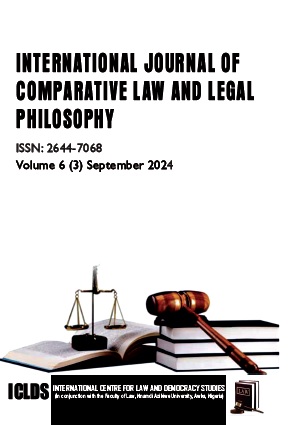INTERROGATING LEGAL AND ETHICAL CONCERNS OF GOD-FATHERISM, GOVERNANCE AND CONSTITUTIONALISM IN NIGERIA’S DEMOCRATIC PRAXIS
Keywords:
Nigerian Democracy, Legal Concerns, Ethical Concerns, Godfatherism, Constitutionalism, GovernanceAbstract
The return of democracy in Nigeria in 1999 after another military interruption between 1983 and 1998 came with it a dangerous form of godfatherism which completely changed the landscape of what democracy should be. Democracy, which is supposed to be a form of representative government for the generality of the people, has now become government for the elites and the selected few. People no longer have a say on who governs them and the policies that are made on their behalf. Dividends of democracy no longer get to the people, but the wealth of the nation is shared among the ruling class, their families and their cronies. This paper took a look at the legal and ethical concerns of godfatherism and the resultant effect on the practice of democracy in Nigeria. The study found that governance in Nigeria is no longer participatory but at the dictates of self-acclaimed king makers and godfathers who have turned government into their private estates. It was also found that godfatherism almost always ends in conflicts between the godfathers and their godsons, leaving the masses to suffer for the resultant effects. The paper contended that godfatherism is not a bad practice but turns into a hydra-headed monster when ethics is thrown to the winds and godfatherism is taken to the level of criminality. The methodology used was doctrinal, analytical and qualitative. Secondary sources such as textbooks, journal articles, and the internet were consulted. As part of the recommendations, this paper called for complete reform of electoral process to render godfatherism unimportant and unattractive. Electronic voting could be a solution to this problem.

